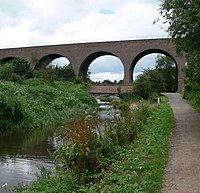Falling Sands Viaduct
Falling Sands Viaduct (Bridge 3) was completed in 1877 as part of the Kidderminster Loop Line. It carries the railway across the Staffordshire & Worcestershire Canal Conservation Area and 64 feet above the River Stour, about a mile from Kidderminster. It is built of red brick and is 132 yards in length, with seven arches of 46ft span.[1] The Viaduct was also numbered as Bridge 3 during the BR era; the BR-era numbering plate, which may still be seen on the northern parapet, gives its location as 135 miles 78 chains.
Contents
Closure
Passenger services
The last scheduled passenger service over the Viaduct was the 19:20 DMU from Bewdley to Kidderminster on Saturday 3 January 1970, with passenger services between being formally withdrawn from 5 January 1970.[2] When the SVR acquired the southern section of the line between Alveley Sidings and Foley Park, the Viaduct remained in the section of the line still owned by BR. Following the SVR's reopening of Bewdley in 1984, BR ran a number of summer weekend DMU specials between their Kidderminster station and Bewdley. One of these was photographed on the Viaduct on 11 September 1982 during the that year’s Enthusiasts Weekend.[3] The last passengers to cross the Viaduct under BR ownership were on the “Severn Valley Enterprise” rail tour from Bewdley to Paddington and back on 8 October 1983.
Freight services
After crossing the viaduct when travelling toward Bewdley, the area of land on the left of the line was the site of the former British Sugar Corporation's Foley Park Factory. Freight services between the factory and Kidderminster continued after 1970, finally ending with the factory’s closure in late 1982.[4] The last visible structures on the site, two large silos, were demolished in 2012 and the area is now being developed for housing.
Preservation
The line between Foley Park and Kidderminster, including the Viaduct, was acquired from BR in 1984, with passenger services commencing on 30 July 1984.
Prospective repairs
Extensive repairs are needed to secure the Viaduct. Water has seeped into the structure causing cracks and erosion, and there is a speed restriction in place.
2016 HLF bid rejected
On 6 September 2016 the HLF rejected a bid from the Severn Valley Railway Charitable Trust Ltd for £902,200 but "agreed the project as a medium priority for support" and "noted that a strengthened resubmission that addressed [its] concerns would be welcomed." The concerns were "that community engagement and interpretation plans were not sufficiently strong."[5]
2017 HLF bid
As of 2018[update] the Trust has another bid seeking £1,018,100 from the HLF for a large part of the £1.275 million project total cost. In June 2017 the Trust secured £71,800 of HLF financial backing to develop its bid.[6] The SVR has the challenge during 2018 of raising matched funding of £275,000 for which the Trust is co-ordinating efforts, and for which it has launched an appeal. The SVR intends to submit the bid by October 2018, and receive HLF’s final decision in January 2019.[7] If successful in securing HLF support, the SVR would intend to complete this urgent project in two stages by 2020.[8]
See also
Towards Kidderminster
List of infrastructure
Towards Bridgnorth
Severn Valley Railway Charitable Trust Ltd
References
- ↑ Marshall (1989) p. 92.
- ↑ Marshall (1989) p. 164.
- ↑ SVR News 66,67
- ↑ Railways in Worcestershire (retrieved 23 April 2018)
- ↑ Minutes - Heritage Lottery Fund: Committee for West Midlands Meeting on 6 September 2016
- ↑ SVR Facebook 18 June 2017
- ↑ Shareholders' Newsletter, undated
- ↑ 'Falling Sands Viaduct', Severn Valley Railway Charitable Trust website (Retrieved 31 March 2018)
